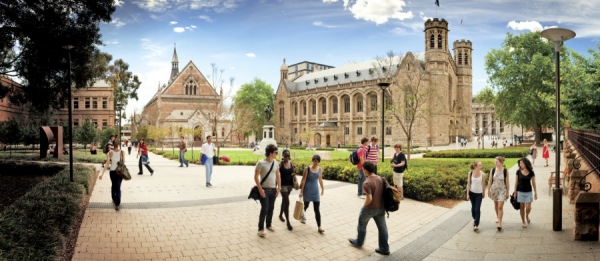“If you’re not getting that flutter of excitement when you read the course details and the module options, then you could be in for three years of hard labour. If you get it right, your degree and the university experience will genuinely be part of your future.”
There is no shortage of information out there for students thinking of going to university. In fact, it’s quite the opposite. The biggest problem is the sheer volume of stuff to read and the number of experts to consult. But out of all the voices, the column inches written, the glossy prospectuses and burgeoning websites, Cook is one of those worth listening to.
Now an independent educationalist, she worked for seven years as chief executive of the Universities and Colleges Admissions Service, Ucas, which oversees applications to British universities. Millions of applications went through on her watch between 2010 and 2017, a period of enormous change and expansion in higher education. Her expert view is that enthusiasm for a subject and attention to the detail of the course are paramount.
‘What’s the workload like and who will teach you?’
Mike Nicholson, director of undergraduate admissions and outreach at Bath University, believes the course is more important than which university you go to. He urges students to find out exactly what a course involves and how it’s assessed. “Not all history degrees are the same,” says Nicholson. “Does it cover the sort of things you are
interested in? How much contact time does the course involve – how many lectures, seminars and tutorials can you expect each week? What’s the workload like and who will teach you? And how is your own work going to be judged?
“A lot of students make assumptions that a degree will be just like school, with the same sorts of assessment,” he says.
But this varies hugely, from three-hour end-of-year exams, to continuous assessment through the year, group work and projects. “Lots of that information is available on university websites, but if you can’t find the answer, email the admissions department to find out,” adds Nicholson.
He also urges students to look at employment outcomes for graduates who have studied a particular course. If you want to be a journalist, ask universities how many graduates from that particular course now have jobs in the media.
“Universities are getting more open with the information they provide,” he says. Prospective students who ask lots of questions are seen favourably. “They show all the signs of being active and engaged.”
If you look at the Guardian subject tables, you’ll find a column for “career after six months”. This tells you what percentage of students have graduate-level jobs (or have gone on to further study) six months after graduation.
Everyone the Guardian talked to for this article, including former students, university admissions officers and sixth-form careers advisers, urged all students to visit on open days if they possibly can. Go twice if you can afford to.
‘Don’t discount gut instinct’
If you miss the open day, arrange an alternative date – universities are desperate to recruit and will be happy to accommodate you. Talk to as many people as possible – students and staff – and spend time on campus and in town to get a sense of a place and whether you might fit in.
“Don’t discount gut instinct,” one career development expert says. “When making your decisions, feeling that you can ‘see yourself somewhere’ after a visit is a powerful driver.”
Catherine Webster, a careers and HE adviser at Hereford sixth-form college, agrees. “A lot of students think they can work out what they want to do just by looking at words and pictures. It’s only when they get to a place and get a feel for it, that they can decide what’s right for them.”
It’s not just about reputation. “I had a student last year who was very focused on going to one university to study photography because of the reputation it had,” says Webster. “When she went and saw its equipment, she wasn’t so impressed. You have to get behind the glossy stuff. There’ll be the universities that look absolutely beautiful in their pictures, but they may be ignoring 90% of their campus.”
Webster concurs that subject and course are far more important than place. “Fundamentally, it’s most important for them to decide what they want to study rather than where. Establish what they’re interested in and good at, then look at which places do that well. It’s all about research really. It’s using reliable resources and being prepared to do some serious homework.”
She recommends starting early: year 10 or 11. Others suggest even before that – when pupils are making GCSE choices in year 9. “The sooner you start to explore these ideas, the more confident you’ll feel later.”
But Webster understands that some young people can feel overwhelmed and just aren’t ready to decide. “I feel sorry for students who don’t know what they want to do. They are carried along on a wave of presumptions: ‘You’re doing A-levels so therefore you must be going to university.’ We have to cut them a bit of slack. A reasonable proportion just aren’t ready to make that decision. They should not feel pressurised. You can take a gap year, as long as it’s productive.”
‘Do as much research as possible’
If you like the look of a course and a university, Nicholson suggests you look into optional extras on offer, like internships and placements. At Bath, every degree course offers students the opportunity to do placements in the UK or abroad. He says it’s worth drilling down to find out what exactly is on offer – is the university saying it’s happy for you to organise your own placement, or will staff actively help you find a placement? “It’s a big decision, so students should be using this time to do as much research as possible.”
If you have a disability or special education need, discuss it with the university. You need reassurance that you’ll get the support you require so you can make your choice without any concerns on that front. “It’s worth starting a conversation early on with a university – before you apply – if there are health issues or mitigating circumstances,” Nicholson advises.
Mental health support is another big issue. Though the higher education sector has woken up to the crisis in its midst, there is variability in the quality and quantity of support and counselling available.
Use open days to ask about support services and how to access them, urges Dr Ruth Caleb, former head of counselling at Brunel University and an expert on student mental health. Can students make direct contact with counselling services themselves, or is there a triage system, where students’ needs are assessed according to urgency? Are the triage teams professionally qualified?
Another good question is whether there is a personal tutor system. How many students are assigned to each tutor, and how often can you see your tutor? “Tutors are often the first point of call for students who are struggling,” says Caleb.
‘Students are most successful in a place where they are happy’
Caleb is particularly concerned about the state of mind of students who experience disappointment on results day and fail to get into their university of choice, then make a quick decision to go somewhere entirely different through the clearing system. “Students are most successful in a place where they are happy. I suggest all universities look after their clearing students and make sure they are happy to be there,” she says.
There are dozens of questions to consider: campus v city, cost of accommodation, night life, societies, facilities, cost of gym membership, travel costs to and from home, work opportunities if you need to support your own learning.
But let’s end with another nugget of wisdom from former Ucas chief, Mary Curnock Cook, and it’s a message to parents.
“I don’t want to upset mum and dad,” she says, “but please remember, this is your child’s future, not your past. Support your son or daughter in a way that makes them feel empowered to make this big decision without worrying whether the parents might approve.”
In other words – parents, back off.









